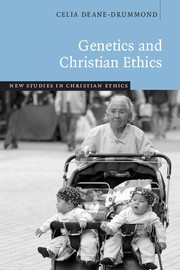Book contents
- Frontmatter
- Contents
- General Editor's preface
- Acknowledgments
- Introduction
- 1 A recovery of virtue for the ethics of genetics
- 2 Theological principles
- 3 Living in the shadow of eugenics
- 4 Genetic testing and screening
- 5 Genetic counselling
- 6 Gene therapies
- 7 Gene patenting
- 8 Women and genetic technologies
- 9 Genetics and environmental concern
- Postscript: Concluding remarks
- Bibliography
- Index
5 - Genetic counselling
Published online by Cambridge University Press: 05 June 2012
- Frontmatter
- Contents
- General Editor's preface
- Acknowledgments
- Introduction
- 1 A recovery of virtue for the ethics of genetics
- 2 Theological principles
- 3 Living in the shadow of eugenics
- 4 Genetic testing and screening
- 5 Genetic counselling
- 6 Gene therapies
- 7 Gene patenting
- 8 Women and genetic technologies
- 9 Genetics and environmental concern
- Postscript: Concluding remarks
- Bibliography
- Index
Summary
Genetic testing and screening necessarily mean that some individuals will be found to be vulnerable to genetic disease, either immediately or in the longer term. Genetic counselling differs from other medical practices, such as consultation, in that it is designed to give those families with particular burdens about genetic disease the time and space to reflect on both the nature of their condition and the likely consequences of it, either for themselves or for their children. This chapter will consider the ethics of current practice, and situate this discussion in the context of broader social questions about the nature of genetic risk. Genetic counselling presupposes that the information given about one's genetic makeup needs to be handled with discretion; counsellors are the new priests, giving access to services such as pre-implantation genetic diagnosis (PGD) or other available ‘treatment’ options. I will suggest that counselling cannot be separated from the medical sub-culture in which it has grown and evolved, and that trying to suggest otherwise is disingenuous. I argue for a greater need for a culture that strives to welcome those with disabilities into the human community and to support families who are likely to be affected, instead of rendering those with genetic disease as ‘unfit’. Such a shift requires a rethinking of prudence at an institutional and political level as well as at an individual and familial level.
- Type
- Chapter
- Information
- Genetics and Christian Ethics , pp. 101 - 123Publisher: Cambridge University PressPrint publication year: 2005

